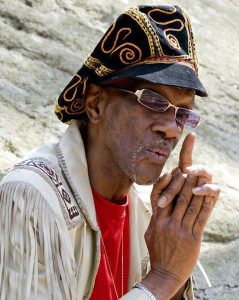The Wonderful Wizard of WOO; An interview with Bernie Worrell of BWO, Parlaiment Funkadelic and Talking Heads
Once upon a time, in this kingdom, two great and powerful wizards shared a meal. One wizard turned to the other during the feast and thanked him for creating powerful tools with which the other had delighted and transformed the kingdom. Pondering his remarks, the other wizard responded, “No, THANK YOU!”
This is a remarkable tale, not of fiction, but truth. And the two wizards … Bernie Worrell – of Parliament/Funkadelic and Talking Heads – and Dr. Robert Moog.
Worrell designed Parliament/Funkadelic’s spaced-out keyboard sound – an intergalactic, synth-drenched whomp that remains unmistakable and unmatched. Providing the fuel behind P-Funk classics like “Give Up the Funk (Tear the Roof Off the Sucker)” and “Flash Light,” Worrell created the ingenious bass line on a Minimoog. Worrell’s work with P-Funk earned him the nickname “The Wizard of WOO (World of Originality)” – and a place, along with the original Parliament/Funkadelic, in the Rock and Roll Hall of Fame. Worrell was also later instrumental with the Talking Heads, appearing on the landmark album Speaking in Tongues and in the Jonathan Demme concert film “Stop Making Sense.”
These days, his troupe Bernie Worrell Orchestra carries the WOO torch, playing new, original music that mines “late-1960s/early 1970s psychedelic rock and R&B … the foundation of funk.” BWO is set to blast off during a tour this December (dates here: https://www.facebook.com/pages/Bernie-Worrell/217445804944683?id=217445804944683&sk=app_123966167614127) and Ghettoblaster caught up with Worrell to chat about all things WOO. This is what he shared.
Do you believe that part of your success has been that you were born with a gift, or do you believe that it is equal parts gifts and work ethic?
I was given a gift and achieved some things because of my work ethic. Some people don’t have to do anything. They just get it. Others have a different work ethic. I don’t control that and really don’t care about it. I just know that I was given a gift and wanted to share it.
Did you attend the induction ceremony for Parliament Funkadelic in 1997?
Yes, we were presented by Prince.
And you went back for the Talking Heads induction in 2002…
I was invited and I was there. David Byrne gave about a three minute speech about me at the induction. I think they had to invite me in order to do “Burning Down The House” (laughter). You know what I mean?
As a young man you studied piano classically, but it was really the analog synthesizer and Moog that would be where you changed the lexicon of how music was written and performed. Did that appeal to you because it allowed you to compose, not only as a pianist, but with a variety of different sounds.
I deal with sound. It doesn’t matter to me whether it is funk, jazz, classical, Indian, reggae, Scottish, Catholic, Roman, chant, American Indian…it doesn’t matter, I deal with the sound. I was trained classically, so I have that part of it. I was also born with perfect pitch, so anything I hear, I can play. The machines…Bob Moog and I had the honor and pleasure of meeting. We met and had dinner together. I’m a grateful person, and so is Bob. I kept saying to him, “Thank you.” And he kept saying back, “No, thank you.” We went back and forth like that for a while (laughter). We were brought together by a higher power, and that’s what happened.
So, I deal with whatever is put in front of me. Some I like, some I don’t. When I hear something that is right, I say, “That’s it. Roll tape.” If I don’t hear it, I say, “See you later. No thanks.” (laughter)
How did it feel to go from an academic background to playing with Parliament Funkadelic? Was it nerve wracking to become a full-time performer?
I teach by playing. In the original P-Funk, I was the academic, the nerd (laughter). I was the nerd of the group. But I was getting their academics from the street side of it. I was in academics all around. If you can’t feel it, like some of the classic crapola, it doesn’t make sense to me. I don’t like something being put on a pedestal and having people say, “This is it.” So, at an early age while being trained classically, I saw how some things were treated and thought, “Oh no, no, no.” Especially after I went to college and saw the Boston symphony, and being in school and seeing all the shenanigans, I thought, “Let me turn this around.” I’ll play anything. Music is music. You don’t have to put anything on a pedestal. Put it on a pedestal, and I’ll tear it down.
Has anyone tried to tell you to tone it down or tried to put you in your place?
I don’t think they can do that (laughter). Aint nobody ever tried. With my teacher in college, I’d go for my lessons, and after a half hour, my teacher, who was Czechoslovakian would say, “Play some of that jazz.” (laughter) I can play anything. I would also play around in the dormitory. Some would be classical, but I’d mix it. That’s teaching in and of itself; recognizing the common ground between different types of music.
Did you realize at the time that you were pushing keyboard to the forefront as a lead instrument in pop and funk music?
No (laughter). I didn’t think about it then, and I don’t think about it now. I just played man. I play what is sent, whether live, recording or writing, I play what I feel, what is sent. I don’t think about making a hit. I don’t think so…
So it was more about playing music with people you connected with?
Right. I do that today. Me and Steve Kimock. I love playing with him. He’s free like me. We’re like two peas in a pod. Also Buckethead, Keith Richards, I play with everybody man…
And Les Claypool…
Yeah, Les is freaky.
Have you ever been freaked out by another musicians personality or found it intimidating to play with them because of who they are off stage?
That’s their business. If you don’t like a person, that’s on you. Step aside. God made that person. Who am I to judge. Someone may not like me, I don’t give a shit (laughter). If something is bothering you, move away from it. That’s the way that person was made. You are your person. Just people. Who are we as humans to judge? Aint nobody judge me, and I can’t judge anybody. Mother nature will judge as we’ve seen.
Given the role of musicians from Dayton, Ohio in the legacy of funk, I imagine this is a place you are familiar with. Have you had the opportunity to rub elbows with anyone from Slave or Heatwave or The Ohio Players?
Yes, many times. We all toured together. Those are my brothers and my kindred spirits. So yes (laughter). We are all in the same family. Different factions, different avenues, same street (laughter). Some took left turns, some right turns, but we all ended up in people’s hearts and minds.
Yours certainly has. Your music has been sampled a number of times and has shaped what people have put into their ears forever. Snoop, Ice Cube, Dr. Dre and others have adapted your music to their own. Have you always been pleased with the way that they’ve done that?
It’s an honor that this generation, my youngsters, my nephews (laughter), have taken it and are turning it on. This is what it is going to be. We’ll carry on from there. Getting monetary payment hasn’t always been easy, but it wasn’t always the artists’ fault. They had advisors who weren’t telling them to pay the right people, which I found out later. I had resentments, but I don’t anymore. Move on. That is one of the BWO songs, “If you want things to be alright, move on.”
Have you heard BWO’s new CD?
Yes, a number of times. That came out earlier this year. What made now a good time to move on with that group?
That was a thing that just sort of came about. Evan Taylor, the drummer, came to management three years ago, and asked if I’d be interested in doing a funkatized jazz standards album. I thought about it and final said yes. The first album came out, and then Evan came back and asked to see if I’d be interested in doing something live. I hemmed and hawed, and final said yes. And BWO was born. I’m thankful to be teaching again on the stage and am really thankful for this opportunity. I teach by playing, like I said. It has been beneficial on both sides; the old teach the new, and the old learn from the young.
You’ve always been the kind of artist who colors outside of the lines, so how much of BWO’s live performance is rehearsed and how much is on the spot jamming?
Percentage wise? I’d say three quarters jamming and a quarter rehearsed. It all depends on the shituation (laughter). I like that, “shituation” (laughter). That sounds better to me (laughter).
What is it that appeals to you about being on the road after all these years?
I have bills (laughter). I owe a whole lot of money so I’ve got to keep going (laughter). That’s the truth. Another part of that is that I love to play and get bored quick. I love new shituations. I love to venture out. I’m an Aries. I’ve got to have something new.
Do you get the same charge playing for smaller audiences?
I like it better. Coliseums and all that, that’s cool. But, no man, I want to be closer to the people. You can feel that energy. It is intimate. I love playing outdoors more than anything. Out with nature, where the music goes into wherever it is going. I like festivals the best.
You won’t get that much nature in Dayton in December…
I was shoveling snow today. I’m in Jersey. My back is hurting now (laughter).
(Visit Bernie Worrell here: http://www.bernieworrell.com/notify-Flag1-User_Notified?aHR0cDovL3d3dy5iZXJuaWV3b3JyZWxsLmNvbS8=.)









Social Media